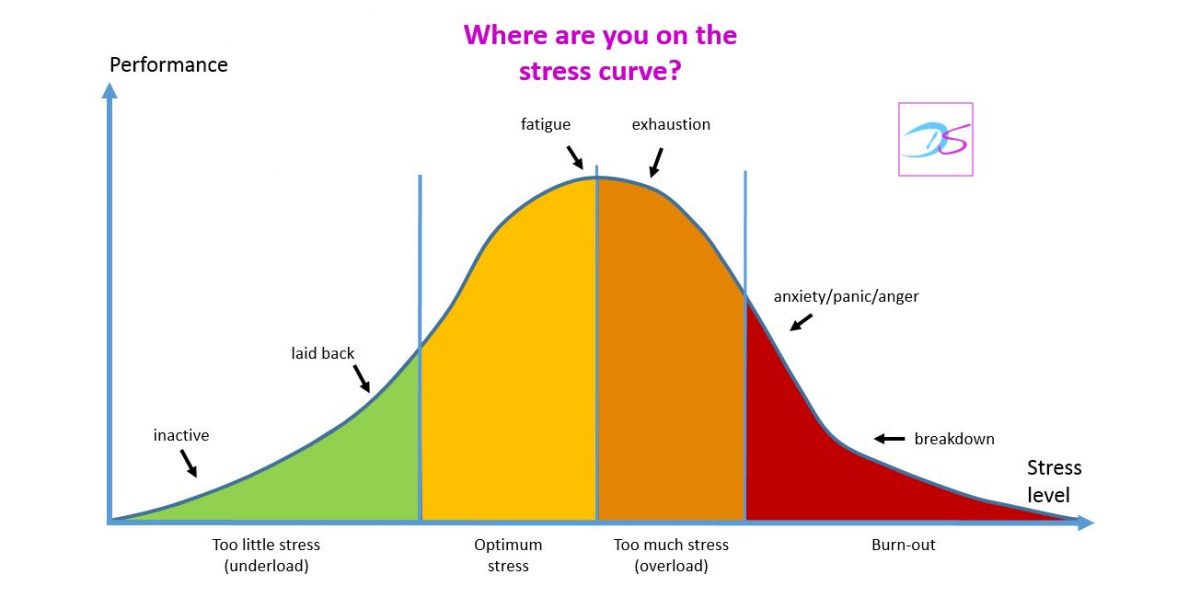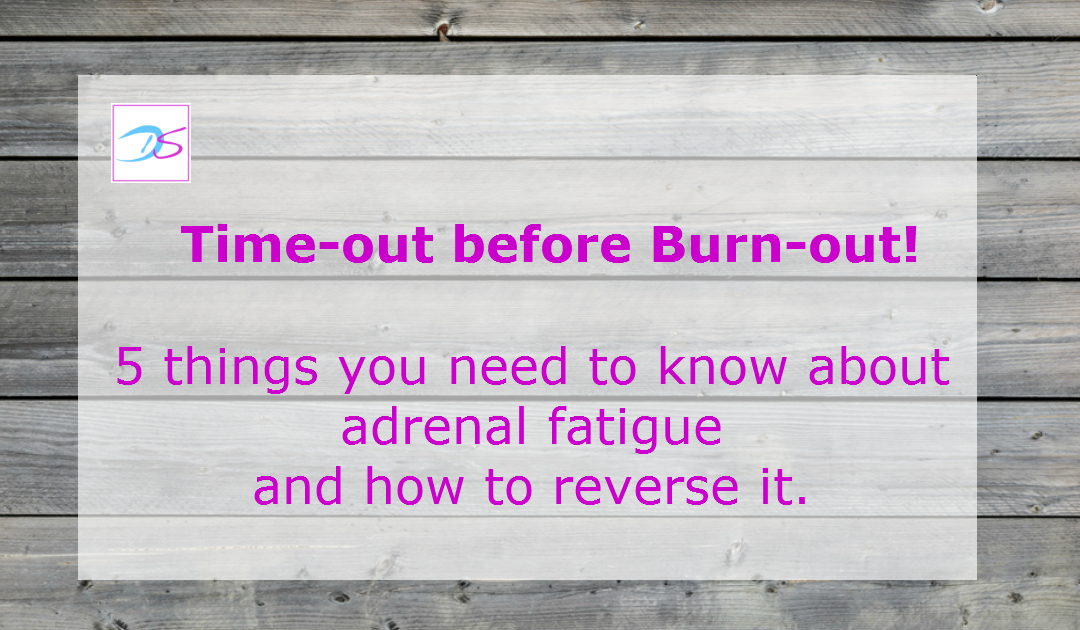Do you know anyone who’s had a burn out or is going through one? Have you ever asked yourself how they got there? Does it seem like something that cannot happen to you? Or have you wondered how you can make sure you don’t end up with a doctor’s note keeping you home with the obligation to rest?
Most of us know someone or of someone who’s been written off sick with a burn out and even though we know it’s stress related, we seem to know very little about how to prevent it from happening. One thing is clear, you don’t have a burn out from one day to the next. Your body signals that you are on the way to a burn out way before your batteries are completely flat.
Take a good look at this chart. Where would you currently put yourself? On the left you can see that not all stress is bad. In fact we need some positive stress, also called eustress, to feel that we are fully alive and performing at our best. You have an optimal level of stress and if that’s where you are, the body can perfectly handle short episodes of dis-stress. It’s when stress becomes chronic that we move towards and then over the top of the hump. Ideally we stay left of the top but when you notice fatigue and exhaustion, alarm bells should be going off. These can signal the first phases of adrenal fatigue (or more correctly adrenal dysfunction).

Here are 5 things you should know about adrenal dysfunction so you can avoid a burn out:
- We are not designed to handle constant stress.
In fact we are designed to handle stressful events about 1% of the time, e.g. when we meet a bear in the woods and either run from it or hunt it to stay alive. When that episode of fight or flight response is over, we would go back to a relaxed state of rest and digest. Now for a moment think of just the obvious stressors that we have in our lives as mums. We juggle a family and a job, there may be tension in the relationship or a stressful situation with the boss, a tight deadline to meet, a sick parent to take care of all the while we are constantly connected to smart phones, tablets, Facebook, emails and notifications. Stay at home mums may face other stressful challenges like never getting a break, sometimes feeling isolated and maybe there is financial worry too. Uff, that’s a long list as it is and it doesn’t even include any of the invisible or hidden stressors like food intolerances, overexercising, exposure to toxins, amalgam fillings, etc. - It’s estimated that 95% of all health issues are caused or worsened by some sort of stress!
Dr Mark Hyman confirms this concept in his podcast with Evan Brand.
Stress does not only make you feel stressed out, tired and irritable. The symptoms you are feeling because of chronic stress signal real malfunctions that can be measured. It’s not just a feeling, something that you can sleep off with a few nights of good sleep. It can really make you sick and if you don’t catch it before it gets really bad, it may take time to recover. - A healthy stress reaction provides extra energy to the muscles and the brain.
With a short burst of stress, the body shunts blood away from the gut, providing it to the muscles to prepare for a fight or to be able to run faster or to the brain for quicker decision making. In this situation of acute stress neither digestion or reproduction are a priority. So imagine what happens to your sex drive and digestive capacity when you run around with the “bear strapped to your back”. - Cortisol breaks down muscle tissue to provide a quick source of fuel for the brain and body.
Cortisol, our main stress hormone, is catabolic, i.e. it reduces muscle mass over time if stress is persistent. If we don’t use the extra glucose that this process provides (because we are not actually getting into a fight or run away), we put on weight especially around the middle. - Initially the extra energy makes you feel great, like you can handle anything coming your way!
Now that you know, how the body provides extra energy to muscles and brain, you can imagine that the extra mental clarity and battery power can make you feel invincible. You might enjoy this feeling and shrug off any warnings because you don’t want to change a thing. Be aware that things may well change if you don’t change things. If you keep going your lifestyle may just push you over the hump of the stress curve. Once you start sliding down, you are on the way to a burn out unless you step on the breaks.
Take time out before you hit burn out!
What you can do to come out of adrenal fatigue:
- Make sure you don’t over exercise. If your exercise regime makes you feel exhausted, take it down to a point where it doesn’t. A daily 30 min walk in nature may be the best exercise you can do at this stage.
- Go on a news fast: most of our news are negative news and they can keep lingering, the same goes for horror movies by the way.
- Avoid processed foods, eat a real, whole food diet. Avoid caffeine after 2pm.
- Have a good laugh. Hug more.
- Go to sleep before 10pm on most days
- Avoid screen light or other bright lights an hour before going to sleep.
- Look for hidden stressors like food intolerances or hidden infections.
- Incorporate relaxation techniques into your life (yoga, tai chi, chi gong, meditation, Emotional Freedom Technique).
- Consider the support of supplements such as adaptogenic herbs to support you.
When you are back in the yellow zone of the stress curve, keep all of these habits to avoid going over the hump again.
If you enjoyed this self-empowering information, please share and sign up for my newsletter to receive more tips on how to feel your best.
Other articles you may be interested in
Are mothers meant to “bounce back” after babies?
Recently I came across and article that clearly promoted that "we are not meant to bounce back after babies. Not physically, not emotionally and not spiritually. We're meant to step forward into more awakened more attuned and more powerful versions of ourselves" (Beth...
Chia seed pudding – yummy breakfast, snack or dessert
I love chia seeds in my breakfast shake and was looking for alternative recipes for these nutrient dense power seeds. Aztec warriors ate chia seeds to give them high energy and endurance. Chia means "strength" in the Mayan language. Today research shows that Chia...
Being gluten free and social
Natasha is a young and very active lady, in fact she has just run the Great Wall of China Marathon, wow! She is has a very slim body and has been very fit until the beginning of the year when she seemed to catch one cold after another. She just did not seem to be able...
Sea bass with lemon and dill – for beginners
Last week we were given two wonderful looking fish as a present. I had no idea what kind of fish or what to do with them but since I like to experiment, I was determined to turn them into something delicious. On the wrapping paper I found a label that said "zeebaars",...
A wonderful gift for a female friend (free)
This blog post is meant for a special group of women, it may not be for you or maybe you are a man reading this. Please do read to the end because you probably know someone who belongs to this group and you can give her a wonderful gift by sharing this with her. As...
What does Pokemon have to do with looking for freedom from weight loss struggle and fatigue?
Your help please While the world is looking for Pokemons I’m looking for women who want freedom from weight loss struggle and fatigue I lost my iPhone to my 8 year old son a few days ago when he decided to join the Pokemon search squad. We live in a small town outside...








